#good omens psychoanalysis
Text
I want talk about how much love was nonverbally expressed *after* their last conversation in S2 Finale.
Yes, you heard right. AFTER.
Sure, they ended the conversation completely pissed at each other. Broken hearted. But, like in any solid relationship, they don't hold grudges. Only a few short moments later, all the anger is gone from Aziraphale's face, and the only emotions left are: love, longing, fear, regret. He can barely pay attention to Metatron, because he keeps looking out the window at Crowley. I think I counted 7 times of him turning his head to look. And of course, he is close to changing his mind several times. (BTW, I would *kill* to know what thoughts were going through his mind right before he committed to leaving, right before he said "nothing at all" with that fake smile)
And Crowley. Most humans, when they feel they've been rejected and/or abandoned - they slam the door and they leave in a huff! They don't look back, they get in their car, and drive away as fast they can, possibly with a middle finger pointed in the direction of the offending party. (Unless they're the type of person who would stand by the door, cry and beg them to stay, but obviously that behavior could never be exhibited by Crowley).
But Crowley does not leave. He does not even try to hide in his car. He stands there, intentionally on display, waiting and watching. Why? Because either A) He is not viewing this as a rejection and abandonment, but as a [huge] difference of opinion, so he is not reacting like someone who has just been rejected. Or B) he IS viewing it as rejection, but he loves Aziraphale so much that his main priority is still to make sure that the Angel is safe, regardless of their current relationship status. His love for Aziraphale is literally unconditional. Crowley wants to watch him walk into that elevator with his own eyes, and make sure that he's not doing so under duress. Or there is option C) He is standing there defiantly, to communicate his disapproval and disbelief at what Aziraphale is doing, like "I can't believe you're actually doing this, I have to see this shit with my own eyes to believe it." Or option D) He is hoping to influence Aziraphale to change his mind, because he knows that its incredibly hard for Aziraphale to leave him. Standing there to send a message of "I'm still here. Are you really sure you are okay with being separated?" Or maybe even E) A small part of him wondered if he (Crowley) might change his own mind about going, once he saw Aziraphale actually walking toward the elevator, once he saw that it's actually happening.
I don't think it's option C because of Crowley's facial expression and body language after Aziraphale gets in the elevator. I don't see any anger, frustration, disgust, or judgment there. All I see is...utter despondency, numbness, melancholy, hopelessness. So, I'm thinking its a combination of reasons A, B, and D. Maybe a little E.
And, I wondered the same about Aziraphale. As he is walking to the elevator, he is not acting as someone who is angry at their significant other. I imagine that a lot of people who feel angry after a fight, and feel their partner is completely in the wrong - they would walk into that elevator without looking back at the offending party. They might put on the happiest face and try to hide all traces of negative emotions, just to "stick it to them." But Aziraphale does look back at Crowley. And, this last nonverbal communication with his partner is also very intentional; he wants Crowley to know that he is looking at him on purpose (just as Crowley's behavior of standing by the Bentley and watching him leave is very intentional). Aziraphale stops and makes eye contact with Crowley, right before he walks into the elevator. Just as Crowley, he is trying to send a message with that pause and look. What message? A) "I can't believe you're not coming with me, I'm hurt and disappointed in you." B) "I want you to know that it's very hard for me to do this, I'm torn about it, and I'm thinking about you." C) "I just found out very bad news and you're in danger." Or option D) "I just found out very bad news and I'm definitely going to need your help. I'll be back."
My opinion is that its a combo of B, C, and D. I do not think its A, based on Aziraphale's behavior and emotions right after Crowley walked out.
So, to summarize the point I am making - despite their deficits in communicating with words, Aziraphale and Crowley continue communicating their feelings nonverbally. They remain committed to each other, even in the face of the biggest rift they've ever experienced in their relationship. Their behavior shows that their first priority in the relationship is not "to be right" or "to win the argument." Their priorities are - taking care of each other. Letting each other know that, "no matter what happens, I am here, and I'm thinking about you."
Thanks for reading! please leave a comment.
#good omens meta#good omens prime#good omens season 2#good omens#neil gaiman#terry pratchett#aziracrow#aziraphale x crowley#ineffable divorce#ineffable husbands#good omens s2#go2#good omens theory#good omens psychoanalysis#good omens s2 finale#good omens finale analysis#crowley loves aziraphale#aziraphale loves crowley#nonverbal communication#crowley and aziraphale#go meta#i should be in bed
586 notes
·
View notes
Text
#good omens#good omens polls#aziraphale#let's psychoanalyze aziraphale shall we#hivemind psychoanalysis#you go too fast for me#poll#polls#ineffable husbands
183 notes
·
View notes
Text
ꔫ ᵎᵎ intro post


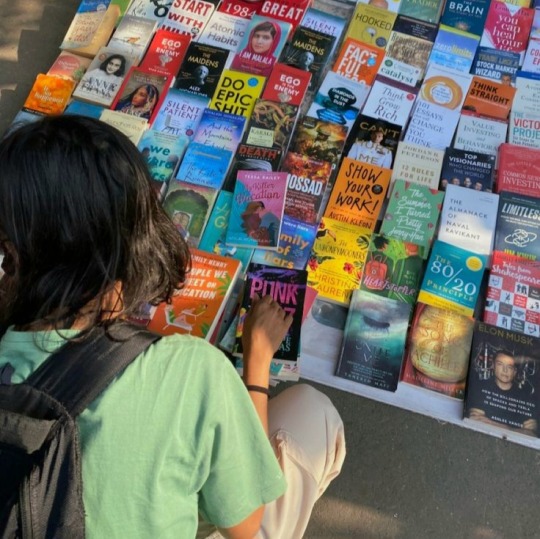
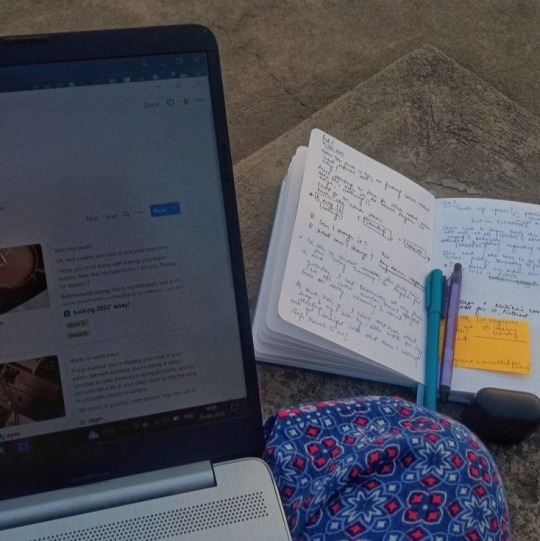
hii everyone, jun this side!! (pronounced j-oo-n)
im starting with visuals/a chaotic mood board since it helps me in acads and the hints of desi studyblr show my general vibe hehe [image credits to its owners on pinterest]
𝘴𝘰𝘮𝘦 𝘣𝘢𝘴𝘪𝘤 𝘴𝘵𝘶𝘧𝘧 𝘢𝘣𝘰𝘶𝘵 𝘮𝘦 ‹𝟹
↬ undergrad
↬ indian
↬ nineteen
↬ she/her
↬ infp
↬ soon to start with my second year
𝘢𝘳𝘦𝘢𝘴 𝘰𝘧 𝘴𝘵𝘶𝘥𝘺 ꒰ ꒱ྀི
↬ majors: psych and economics
↬ minor: english literature
𝘸𝘩𝘢𝘵 𝘵𝘰 𝘦𝘹𝘱𝘦𝘤𝘵 𝘰𝘯 𝘵𝘩𝘪𝘴 𝘣𝘭𝘰𝘨?
↬ psych, econ and literature related stuff, reblogs, moodboards and desi shitposting hours are always opened
↬im all about chaotic academia. scattered books, kadak chai by my side, brown noise which doesn't really help, lmao. messy notes, cant get over spiral notebooks, probably never going digital w note making
↬ if possible, ill try to share my realistic [slow] study routine and the syllabus/assignments i could catch up with
𝘢𝘪𝘮 𝘣𝘦𝘩𝘪𝘯𝘥 𝘵𝘩𝘦 𝘤𝘳𝘦𝘢𝘵𝘪𝘰𝘯 𝘰𝘧 𝘵𝘩𝘪𝘴 𝘣𝘭𝘰𝘨? ⑅ ⠀⠀⠀⠀ ⠀
↬well, to put it simply, build my intrinsic motivation and be more consistent irl
↬hopefully, connect with more desi/non desi students and other interesting tumblrinas :)
𝘰𝘵𝘩𝘦𝘳 𝘪𝘯𝘵𝘦𝘳𝘦𝘴𝘵𝘴 𝘢𝘯𝘥 𝘧𝘶𝘯 𝘴𝘵𝘶𝘧𝘧 𝘢𝘣𝘰𝘶𝘵 𝘮𝘦
𐀔 ִ 🎞️ ׅ ꣹ ۫ 𖨂
↬ if you recognize the artist in my pfp, then hello fellow mitski stans<3 my toxic trait is being delusional enough to think mitski has signed my adoption papers. ⠀
↬ connect with me through music :)⠀
↬ i have loved to dance ever since i learned to walk
↬ i journal on most days
↬ a lot into astrology and reading birth charts
↬ kadak chai mein meri jaan basti hai
↬ recently started with crocheting
↬ like to read poems more than books:3
↬a very slow reader and an even slow eater
↬ i like to sit in silence for at least 15-20 mins nearly every day, zero thoughts in my brain. weirdly comforting. no, idk if we can call that meditation-
↬ series/movies i love love love: tmkoc- my beloved, FIR, hannibal (nbc), hannibal (trilogy) , girl interrupted, Beetlejuice movie, suspiria (2018), black swan, call me by your name, modern family, the office, bk99, heartstopper, good omens, and the upcoming percy jackson one T_T
↬ special mention for desi cinema: om shanti om, masaan, lunchbox, raanjhanaa, jaane tu ya jaane na, jagga jasoos, cobalt blue, jab we met, kahani, talaash, taare zameen par, the blue umbrella, qala, bulbbul, most irrfan khan movies, barfi, bhool bhulaiya, stree, 3 idiots. and a lot more
↬ studio ghibli, my beloved.
Well, thats the end to the intro post, thanks for staying and reading , stay hydrated jaanis<3
#desiblr#desi tumblr#desi tag#desi shit posting#desi stuff#desi studyblr#desi struggles#desi humor#desi psych student#psychology#psychoanalysis#psych student#psych studyblr#chaotic academia#chaotic academic aesthetic#mitski#dark academia#good omens#mitski miyawaki#studio ghibli#uniblr#college#india#indian#economics#literature#booklr#books & libraries#infp#mbti types
40 notes
·
View notes
Text
Things liberal goyim aren't allowed to have until they stop calling for the death all Jews and start calling out their antisemitic friends
Every piece of media created by Jews, including but not limited to: star wars, superheroes (any of them), good omens, what we do in the shadows, our flag means death, gravity falls, big bang theory, any Sondheim musical, crazy ex girlfriend, anything by Michael schur, BoJack horseman, rick and morty, scooby doo and heartstopper.
Laser
Email
Diapers
MRI
Every piece of media inspired by monotheistic religion, even if it's anti religion.
Mobile phones
Disk on key
Every research by a Jewish scientist ever, actually
Barbie
Vaccines
Condoms
Video games
Music by Jewish musicians, like Adam Levine, pink, will wood, ajr, Bob Dylan, Barbara Streisand, doja cat, drake, Leonard Cohen, Amy Winehouse, Neil diamond, KISS and daveed diggs.
Google
Jeans
Ballpoint pen
Color television
Psychoanalysis
Bagels
Progress achieved by Jewish politicians, activists and scholars, like Magnus Hirschfeld, Harvey milk, Larry Kramer, Bernie Sanders, Ernestine Rose and Gloria Steinem.
Pacemakers
Stainless steel
Weekends
Fantasy creatures, mainly goblins, dwarves and witches
Add more in reblogs
188 notes
·
View notes
Text
Good Omens Fic Rec: soon you'll grow so take a chance with a couple of kooks (hung up on romancing)
The image of Aziraphale — his bowtie undone and his coat long abandoned, his shirtsleeves rolled up to his elbows — with a newborn tucked snugly in the crook of his arm like some sort of angelic nanny will stay with Crowley long after this world is nothing but a smoking crater.
Length: 20,569 words
AO3 Rating: Teen and Up
Best for: Safe in Public, Fluff, Pick-me-up, Parent
Triggers: None
Read it here, fic by mygalfriday (BrinneyFriday)
*Minor Spoilers* It's not a secret I love parenting stories, the psychoanalysis on that is obvious, so Ineffable Dads will always win my heart. I loved this little story of Crowley deciding to kidnap the Antichrist and raise him with Aziraphale instead of delivering him to the nuns. This story is pure fluff and domesticity! This is all about watching over this little family as they grow and the little bumps along the way. It's incredibly low stakes, there's no real fear of Heaven and Hell, or retaliation for their actions. Well, Aziraphale and Crowley do have those fears, but that isn't what the story is focused on. This story just wants to tell a lovely story about two dads and their wonderfully inquisitive son. A perfect little pick me up, when you need something soft and domestic!
Read it here, fic by mygalfriday (BrinneyFriday)
#good omens#good omens fanfiction#good omens fanfic#fanfic rec#aziracrow#good omens fic rec#aziraphale x crowley#soon you'll grow so take a chance with a couple of kooks (hung up on romancing)#mygalfriday#safe in public#medium#pick me up#fluff#parent#south downs cottage#canon au#no spice
22 notes
·
View notes
Text
(Influenced by @lonecapybara post, love ya bestie)
Yesterday was SUCH a good day for another Richas' psychoanalysis. How he argued and confronted Bad about ElQs death. This kid keeps seeing everyone he loves getting hurt for going against the Federation, and now he saw Bad directly attack them again
He is so scared Bad might be taken, or even it branches out for Roier and Cellbit again. He's scared for Dapper and Pomme. He's scared for anyone but himself, he sees himself as a bad omen, cursing everyone around him
And how, in a way, he's right. ElQ is angry at Roier, at Bad, at Max. But also at HIM. He thinks Richas was in the plan bc Richas was tagging along. Richas, who was just afraid to leave Roier alone and losing him too. Richas, who loves his Pa Quack and can't help but feel a bit of affection to ElQ as well
Richas, who would follow ElQ if asked, because he thinks the targets are his dads, and not him
117 notes
·
View notes
Note
Current on repeat is artificial suicide by bad omens (their shit is fucking good if youre into that type of music)
That song fucks!!! I only knew of their album Finding God Before God Finds Me and to me they are like a more grown up version of Pierce the Veil (this is purely subjective based on my life experiences lmao). Great rec
My psychoanalysis will be based on absolutely nothing but vibes. This song is giving he/him dyke or she/her twink. It's giving someone whose favourite fictional characters are all exact copies of themselves, but they still wish they were more like character X while everyone is like uhhh that's you buddy you're there! It's giving messiest bedroom ever but handwashes dishes to put them away because the sink needs to stay tidy.
Hope that makes sense xx
0 notes
Text
Something I've noticed being on the sidelines of both the Our Flag Means Death and Good Omens fandoms...
While there does seem to be quite a lot of similarities, I find the differences interesting.
The similarities are likely commonalities between most fandoms. I have to assume the similarities are rather consistent. I'm rather new to all of this, even though I've been around these spaces since Firefly was a huge thing.
What amuses me is that during the period after OFMD came out I observed and found myself drawing more and more. I delved more into art. Not just art in general but learning and striving to be better at specific mediums. With Good Omens I found myself looking up historical and literary references, going back to the Good Omens book, reading and rereading other peoples research on topics surrounding symbolism and literature. I also wrote more in general.
I am already a hobby artist, but I neglect my practices. This being said, I noticed several other people reacting to OFMD in the same way. I feel like this is the influence of people involved in the show. There are some notably outward artistic and creative individuals on the show and behind the show.
Most shows have people like this, but with ofmd, the cast and crew seemed to be the driving force behind creativity in the fans. One of the stars, director, and producers is a visual artist who promotes visual art. The creator himself is more of a visual artist in that he draws inspiration more from movies and television than the written word.
With Good Omens, there seemed to be a draw more towards indepth analysis of plot and character; a focus on critical thinking. This was reinforced by much more thoughtful writing overall. Note that I'm not saying better. Both shows have extremely creative writers writing fan fiction. Good Omens seems to have more literary influence backed by extensive research and psychoanalysis. The original having been a satire based on biblical characters and themes might be the key here. What I found most interesting is, that while I write a lot more, I have not published any of the writing for others to read. I keep reworking it as if it were entirely a fiction story of my own creation. I want to get it right. My writing for OFMD was more fun, silly, and angsty.
I do want to point out I noticed a fair amount of people in the OFMD looking at the visual symbolism in the show itself. I found that interesting. It is indeed a similarity to Good Omens, but I feel the flavor is slightly different. OFMD symbolism is mostly visual as in color choice, flowers, scenery, props, costuming, and visual cues. This goes in line with my visual artist focus for this show.
Both fandoms lean greatly into music. I suppose this makes sense, because, a. many creative people use music as an outlet, and b. both shows have creators who use music heavily as a theme in their works. Good Omens would not be the same without Queen, Buddy Holly, great classical and romatic era music, and a mention of the Velvet Underground. OFMD would also not be the same without the song The Chain, Cat Stevens, Eric Satie, Moondog, Leonard Cohen, and Lou Reed.
This being said, I personally felt more freedom to play with music and make playlists for OFMD. I'm a musician and this is a long standing hobby of mine. Good Omens did not inspire me to make playlists as much as I saw others doing it. I was either too focused on critical thinking and history research or I felt that the song selection was less of an inspiration to add more of my own and more a solid fact. These are the songs, find their significance. For me this is part of the difference between the two shows.
What it really comes down to, for me, is that one show made me feel like I was a part of something, a crew working together and the goal was creativity and celebrating queerness in many forms. The other show helped me understand or rather question an individual's place in the world. Who are we, as humans, and why do we make life so darned difficult for each other. But also, it is possible to enjoy life more fully if we allow ourselves the freedom.
Extra: I loved how a certain faction of OFMD fandom/cast brought their own personalities into the fandom. Two great examples are the famous orange cake recipe and the cryptid inspired ARG based on a similar but fictional show.
0 notes
Text
tagged by: @rainbowcarousels (thank you!)
current time: 2:46 pm
current mood: Stressed and ready for a G&T
current activity: Procrastinating work
currently thinking about: Work frustrations, things i need to get done before family are in town next month, and anything I might have missed cleaning/decontaminating in the recent Battle Against F'ing Fleas the Cats Caught from the F'ing Racoons we just had removed from the attic.
current favorite song: Broken Glass by Kygo, Kim Petras
currently reading: The Invisible Library series by Genevieve Cogman, The Notorious Scarlett and Browne by Jonathan Stroud (to the kiddo), A Godless Jew: Freud, Atheism and the Making of Psychoanalysis by Peter Gay (inspired by recently seeing the Freud museum in Vienna), and The Reluctant Empress by Brigette Hamann (also Vienna-inspired). AO3 (duh)
currently watching: Rewatching Good Omens and old Qi reruns (my comfort food)
current favorite character: Right now I'm flipping between Xenk in dnd-hat and Hob in Sandman, but it changes regularly
current WIPs: Umm...not what you're going for here lol, but revising a paper on diversity equity and inclusion for telehealth in pediatric health care and drafting two other papers on treatments for achalasia and a randomized controlled diet modification study for treating eosinophilic esophagitis. Do those count?
I don't know a ton of people on here lol...maybe @qqueenofhades, @seiya-starsniper or @unknown-lifeform if you guys haven't done it and want to? :) no stress.
1 note
·
View note
Text
What does it mean when you dream about a spider
All kinds of bizarre things can happen when you close your eyes: teeth falling out at a dinner party, out-of-control cars, and yes, even creepy arachnids. So, don’t fret if your good night’s rest has turned into a Fellini film lately—specifically the kind that features uninvited eight-legged creatures. Your subconscious is a complicated place so there’s no single explanation for spiders in dreams. Having said that, we reached out to several dream experts to get the lowdown on what it might mean when you have spiders in your dreams, so read on for the full scoop.
What does it mean when you dream about a spider
What Do Dreams About Spiders Mean?
So, some eight-legged guests have invaded your after-hours brain. (It happens.) But what does it mean when you’ve had a creepy—or even more confusing, a pleasant—dream with a spider in it? Well, it turns out the answer isn’t so cut and dry. In general, the experts agree that dreams are highly individualized experiences, and such symbols leave a lot of room for interpretation. “We are all highly individualized beings, with a whole set of experiences, history, cultural effects, preferences, and associations that color the meaning of dreams,” explains clinical psychologist Nancy Irwin. That said, here are some common themes the pros have picked up on.
1. You’re tapping into your inner strategist (or seductress)
When you think of a spider in terms of an animal totem while considering its behavior in nature, you can gain a better understanding of its symbolism in your dreams, says certified hypnotherapist and dream expert Kelly Sullivan Walden. “Some animals pounce, some intimidate, some are elusive—but the spider lures in its prey...Because everyone and everything in your dream is you, dreams of a spider [may] symbolize that you are connecting with the part of yourself that is strategic, methodical, enticing and seductive.” Sounds intriguing, right? If one of these dream weavers makes an appearance while you’re snoozing, consider that your subconscious might be trying to tell you that a methodical approach is in order when it comes to accomplishing your more complicated designs.
2. A message to let things come your way
Indeed, per Walden, “dreams of a spider are the ultimate message that you are weaving your dreams into reality.” Still this dream expert is quick to add that the takeaway could very well be that your best bet is to channel the spider’s patience: “Because spiders weave a web that draws their sustenance to them, this dream may be a message to stop running around, slow down, make your space appealing and await the energy and attention that comes to you.” (Plus, no one is going anywhere these days anyway, so we’d say that’s a pretty sound strategy to practice in waking life.)
3. Prosperity is on your mind
What do spiders have to do with prosperity? Well, not nothing, apparently. Walden points out that the anatomy of a spider is also key to understanding its symbolism in dreams, positing that its eight legs carry the same significance as the number in general—namely “abundance, prosperity and infinity.” Bottom line: Walden’s view is that no matter how you feel about these creatures in real life, a night time visit from a spider may in fact be a good omen. Or, at the very least, a message that you should follow your dreams (rather than, say, swat at them with a broom). These eight-legged friends are the original dream-weavers after all.
4. You’re feeling entangled or trapped
As mentioned above, the web-spinning nature of a spider makes it a potential symbol of empowerment. That said, Walden acknowledges that all dream occurrences are an expression of the Self. As such, you might consider what aspect of the spider the Self is identifying with when you’re lost in dreamland. Want to skip the psychoanalysis? (We get it.) Just ask yourself whether you think you are sitting pretty in a web waiting for success or feeling paralyzed with ambivalence and stuck in a rut (read: spider’s web).
5. Fear of the unknown
According to Danielle Massi, LMFT, spiders tend to represent the unknown, so “it could be that something you fear is creeping up on you and the unconscious mind is giving you a warning.” That said, Massi emphasizes that the key to understanding a spider in your dream is to ask yourself how you felt about seeing it—since dreams are subjective, the emotions tied to any symbols will help give you a clue.
6. You have hidden emotions that need to be addressed
Dr. Irwin says that dream images aren’t typically literal, but rather “a metaphor to draw your awareness to a feeling you are experiencing at the time of the dream.” What that means is that a spider in your dream could signify any number of feelings that your brain needs to process while you get some shut-eye. This is particularly true if you have a fear of spiders (*raises hand*), in which case they might represent “the presence of a creepy person in your life...or a fear of being petrified by COVID, finances, or some other uncontrollable factor in your life.” Again, the significance of a spider in your dream has a lot to do with what’s going on in your life, and how you feel about the creatures. Irwin emphasizes that “context is everything” and people should consider dream symbols as an invitation to connect with their own (back-burner) feelings, as a means of release and healing.
7. General anxiety is making itself known
And on that note, clinical psychotherapist and Columbia University faculty member Laurel Steinberg agrees: A dream about spiders can just be pretty straightforward. “While they are typically small in size, spiders are so creepy (and crunchy!)...[they can] invade our personal space, or worse, crawl onto our bodies. For this reason, dreams about spiders are indicative of subconscious anxiety about feeling vulnerable and out-of-control of some aspect of our lives.” Sound familiar? Yep, more than one professional has a similar take on this dream symbol, which isn’t surprising—general anxiety is very common and it has been on the rise since the pandemic struck. That said, if it starts to interfere with your quality of life—by keeping you awake or giving you stressful dreams, for example—you should absolutely talk to someone about it.
0 notes
Text
I forgive you = I don't forgive myself.
Here is a little psychological analysis of the worst sentence ever uttered in the history of everything. I've decided that Aziraphale is utilizing a subconscious psychological defense strategy called "projection" (I'm a professional psychologist, so I can use the lingo :P)
We all use this at certain times in our lives. What happens is, when we feel that our behaviors, feelings, or thoughts are unacceptable; When they go against some of our values and create an internal value conflict - we feel shame, anger, fear, confusion. Feeling this way about ourselves is extremely uncomfortable, so sometimes, instead of acknowledging those feelings ("Wow I am feeling really angry at myself right now"), people will *Project* those feelings onto the person who is involved in the situation that is causing us to feel that value conflict. And, we are more likely to use this defense strategy when our emotional resources have been depleted. When we don't have the emotional energy to recognize and cope with painful feelings that we are feeling. Sometimes its just easier to be angry at someone else, instead of being angry at ourselves, you know?
Now, lets look at how this concept applies to Aziraphale's reaction to *The Kiss.* We know that his emotional resources have certainly been depleted by all of the emotional events that just occurred in the span of a day: planning and executing the ball, building up the courage to ask Crowley to dance, actually dancing with Crowley in front of everyone, realizing that he put his guests in serious danger when demons show up, fighting for his life, seeing Jimbriel and Beelz get their happy ending and realizing that it is possible, seeing Metatron come down from Heaven, and finally being offered an insane opportunity for himself and for Crowley. Wow, that is.... A LOT, don't you agree? So, by the time Aziraphale is having the "final 15" conversation with Crowley - he can no longer effectively process unexpected and complex thoughts and emotions.
Uuuuunfortunately, that is exactly what he gets during the conversation with Crowley. First, Crowley has an unexpected and complex reaction to the offer of being together as angels (unexpected to emotionally unhinged Aziraphale, not to us of course). Then, Crowley proceeds to drops an emotional bombshell by doing something that has never been done before - openly discussing the nature of their relationship and his feeling about Aziraphale. After that, Aziraphale himself chooses to show the most vulnerability and honesty about his feelings that he has ever shown (i.e. "I need you!"). And what is the final cherry on top of this "emotional tsunami" pie? The straw that completely breaks the camel's back? (aka temporarily breaks his friggin mind) ***THE KISS.***
As an aside, I am not AT ALL saying that Crowley was wrong for anything that he did or said in the final 15. I believe he was right to say and do all of it. I am simply breaking down the factors that were present in the context of that conversation. And one of the factors is -- the timing of it all was just horrendous. It was horrendous, because both of them had very depleted emotional resources at that moment in time. Aziraphale was basically primed to become completely overwhelmed and confused by all the new and complicated emotions/ideas that he was required to process. On top of it, he was required to process them in a very short amount of time, with damn Dickatron putting pressure on him to make a decision ASAP.
Okay, so what do humans do when we are completely overwhelmed by thoughts and emotions? Sometimes what happens is - we REVERT to the familiar. We REGRESS to things that are the most automatic and easiest to understand. We revert to thoughts and behaviors that have been the most practice, even if they are not effective and not relevant to the situation at hand (which we don't recognize until later, when we are out of that "fight of flight" state).
Back to Aziraphale. He is experiencing an insane amount of emotions during and after the kiss. He is trying to process his emotions and the implications of the kiss; and he is also trying to make a super hard decision, all at the same time. What he should have done is say to Crowley - "wow this is a lot for me to process right now and I'm completely overwhelmed. Can I please have 15 minutes to myself so I can re regulate my nervous system, and then we will keep talking?"
Unfortunately, when we're overwhelmed by emotions - its really hard to see the different options available to us. We go into a sort of "tunnel vision" and revert to our internalized and automatic beliefs and behaviors. For Aziraphale, that means - regressing to the old beliefs that Heaven has programmed into him. Maybe beliefs like: acting on carnal desires is wrong (look at what happened to adam and eve); good angels don't engage in physical intimacy and they certainly don't crave it or enjoy it; it's selfish to consider choosing your personal happiness and your personal desires over an opportunity to help others/help the world. If those are some of his old values - Aziraphale has just acted against all of them!
When we act against our old values (even when we know that those values are no longer working for us, and we are actively working on changing them) - we still feel ashamed, guilty, and angry at ourselves. This is especially likely to happen in times of great stress and emotional overwhelm. So, now we get to the equation from the top. Aziraphale is feeling ashamed of himself, angry at himself, and guilty for his thoughts and feelings (i.e. for liking/wanting the kiss, for loving Crowley, for wanting to be with Crowley more than he wants to "help the world").
He is feeling that he needs to be forgiven for the way he feels, and for the way he is. However, due to his temporarily deficient emotional resources - Aziraphale is not able to accurately attribute the feelings he is experiencing (anger, shame, guilt, desire for forgiveness) to the correct source. He mistakenly decides that he must be feeling those feelings towards Crowley (not toward himself), and he must be feeling them because of what Crowley did (Kiss him), not because of what Aziraphale did (enjoy and reciprocate the kiss). And Viola, the process of Projection is now complete.
He says: "I forgive you" to Crowley, but Aziraphale is the one who wants his own forgiveness. Which, unfortunately, he does not get. At least not yet. (Yay for religious trauma).
In conclusion, the sad thing about bad timing and projection is: now Crowley is worried that Aziraphale sees him as sinful and unacceptable, as someone who needs forgiveness. But the truth is, Aziraphale is the one who still struggles with seeing himself as sinful and unacceptable, and as someone who needs forgiveness for his urges, desires, and feelings.
But, the good news is - Aziraphale does not always see himself in that way. We know that he has been putting a lot of work into breaking away from heaven's toxic values, and into developing his own values (e.g. "our side"). Like I said above, old habits die hard, they are more likely to surface during times of stress, and all that is a normal part of the process of psychological change.
I am very confident that once Aziraphale has a hot minute to himself, once he has time to calmly process everything that's happened - he will see some things differently. And he will eventually be doing the Apology Dance for "using projection as a deadly weapon. " :)
#good omens#good omens meta#good omens theories#good omens season 2#aziraphale x crowley#good omens prime#ineffable husbands#ineffable divorce#aziracrow#good omens s2#good omens analysis#good omens psychoanalysis#good omens finale analysis#good omens final fifteen#good omens i forgive you analysis#they will figure it out#writing this helps me process my angst
147 notes
·
View notes
Text
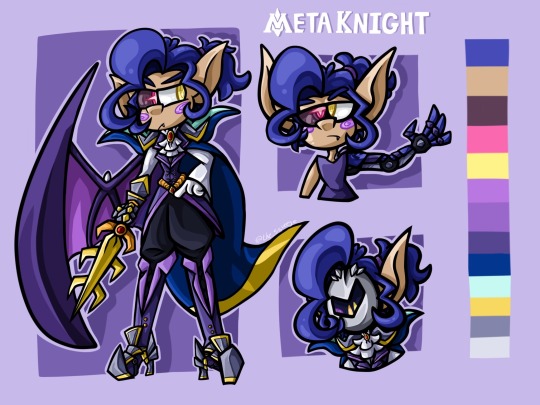
AH SO I FINALLY FINISHED AN OFFICIAL REF FOR MY META KNIGHT GIJINKA AND? Not gonna lie I’m pretty happy with his design and stuff (:
I HAVE. SO MANY NOTES
So uh feel free to read them below the cut 😳
warning it’s a LOT
OKAY HERE WE GO
for starters, these are specific to my gijinka, buuuuut most of them also fit my general interpretation of him
- Meta Knight is not his actual name. It’s just the title he gave himself to sound cool.
- As such, he’s not technically a knight, just in spirit. A meta knight, if you will (:
- He takes his image very seriously. It used to be so bad that he would take literally everything seriously, and had a reputation for sucking all of the life and fun out of everything and anything. But, he’s softened up a lot since he came to dreamland. He’s actually a pretty fun guy nowadays (and maybe just a little chaotic, or, rather, enthusiastic when excited...)
- Because of his once dreadfully serious nature, his face is stone cold and “dead eyed”. Once he broke himself of his old habits and lightened up, he became humiliated by how stone faced he is, and it’s one of the many reasons he wears his mask.
- Speaking of his mask! He is sensitive to light, and his mask helps tone it down for him. He can go without it, but if he’s in a well lit area for awhile, he will start to get a migraine.
- As such, he has pretty good night vision.
- Yes...he is very bat like. That’s for a reason! My hc for my puffball gijinkas is that they have a lot of traits similar to their wing type. For instance, since Galacta has bird wings, they have some bird like features like sharp vision, soft feathers strewn about their hair, and squawking when startled.
- Yes, this implies that Meta makes cute bat-like trills and squeaks......(he also purrs. puffs purr, because they are basically just round cats)
- He is very kind and caring beneath his persona, which has become more and more evident. He is also incredibly protective of those close to him. He secretly worries he will lose them, and as such, he does everything to keep them around.
- Despite his agility, he can be quite clumsy at times. This has led to some...embarrassing injuries.
- He’s tiny! 5’0 with heels and 4’10 without them, but since he almost always wears them, he will tell people he is around 5’0 (but almost 5’1!)
- As a knight of sorts, he has a strong sense of chivalry (which is basically canon). It is hard for him to accept any sort of kindness, since he feels he owes something in return. He always makes sure to express his gratitude however he can.
- However, he is really bad at emotions and expressing himself. He suppressed most of them early on when he was painfully serious, and as he’s lightened up, he’s had to deal with actual emotions.
- He uses art and poetry to cope with this and express his emotions. He never lets anyone see it though.
- He also draws cute things. He loves cute things, but is still hesitant to let others know this, as he worries it will
- a) damage his reputation and
- b) confirm to him he is, very much, a rather cute little puffball
- There are many (often very specific) things he is fascinated by, and can talk on for hours on end. However, his more personal and less “serious” interests he rarely talks about to anyone he isn’t close with, and if they’re brought up in public, he often gets very flustered. (yes, he’s shy but he’ll never call it that)
- He loves sweets and has a passion for baking. He’s quite good at it, but not at cooking actual meals.
- Despite Kirby (and the meta-knights) thinking of him as their dad, he is absolutely horrid with children. Does not know how to deal with them. He gets very flustered (and often frustrated) if he ever has to watch them. Since he doesn’t really know how to deal with them, he kinda just treats them as he would anyone else. Because of his caring and protective nature, many still consider him dad-like.
- Oh yeah, Kirby is the exception to this since he is (usually) such a wonderful little dude. If left alone with the other puff, he can act like a semi-competent father. It is very rare that this actually happens though.
Okay, time for some darker headcanons, including a lot of post Mecha Knight stuff (‘:
Oh yeah I have a Mecha Knight gijinka too 😳
-He suffers from depression. This was one of the main reasons he used to be so dreadfully serious, and why he’s so used to suppressing his emotions. He used to use his knightly persona as a not-very-healthy way of coping.
-As a bit of a lighter note, after many years of care and support from his friends, he’s seriously lightened up.
-However, he still has days when it surfaces, and it often takes the whole day to get him back to a more functional state. Yes, even Meta Knight has to take mental health days sometimes (:
-He has a serious issue with abandonment. He worries nobody could actually care about him, and frets constantly that he will lose the people close to him. This stems back to when he got his wings, as many saw them as “demonic” and as a “bad omen”
-Because of this, he has a really low self esteem, which, again, is why he used to live through his knight persona primarily, and was so ashamed of his actual self.
-The Mecha Knight incident left him with serious mental scars, giving him minor ptsd through nightmares and panic attacks when strongly reminded of the incident.
-It also left him with a robotic eye and arm.
-During his fight with Haltmann Works, his non-gauntlet arm was severely injured. Instead of just trying to fix it, Susie gave him a shiny new robot arm. It was originally Haltmann red and black, but he repainted it and, with some help from his crew, slightly modified it to more of his style.
-He also had an eye replaced in order to be compatible with the “eye” that swerves around the mask. He’s been too scared to try rewiring or recoloring it.
-The Mecha Knight incident really set him back from all the progress he made.
-During the first few months post Mecha Knight, he hid himself, only showing up when needed. He became paranoid of him hurting his friends without knowing it, which furthered his isolation.
-Much like how he managed to learn to cope better with his depression, it took him a lot of time and help to get him back to where he used to be.
-And, to end this little segment on a happier note, as of the time of Kirby Fighters 2, he’s much happier than he’s ever been. He’s made a lot of progress, is much more open with others, and much more accepting of his soft side (:
I could honestly go on and on, I have SO MANY notes that haven’t made it into this post, including his backstory, his relationship with the other characters, and a few other miscellaneous details (I even gave him a more...normal name that he never uses cause its cute and why not). If anyone’s ever interested in more though, feel free to ask me, I do have anon ask on after all, and boy do I have a lot to say (:
God, maybe I put a little too much thought and psychoanalysis (and maybe just maybe a liittllleee too much projection) into my interpretations but? hey, I had fun with it
If you actually read all of this bullshit, holy shit thank you and I hope you had fun too (:
#meta knight#gijinka#meta knight gijinka#my art#whollleeeee lotta notes#a whole heaping ton#hey what can I say he means a lot to me and I have a lot to say (:#might do refs like this for galacta and morpho and some point 😳#also low key been workin on other gijinkas :0#also aLSO#sorry for the lack of art lately this took wayyyyy longer than it should have hgfegsjak
71 notes
·
View notes
Text
My Descent Into Ineffable Madness And Why I Don't Regret It
by elf_mischief
Okay so here's the thing about Good Omen's fanfiction. It's a balm for my soul. Okay? It's a spiritual experience. It's healing my heart. It's teaching me things about myself every day. It's giving me better and stronger orgasms more often than I have ever had before (I'm serious). I never knew I could get so many needs met by reading words on a screen. What on earth is happening here??
Words: 2251, Chapters: 3/7, Language: English
Fandoms: Good Omens (TV)
Rating: Teen And Up Audiences
Warnings: No Archive Warnings Apply
Categories: M/M, Multi
Characters: Aziraphale (Good Omens), Crowley (Good Omens)
Relationships: Aziraphale/Crowley (Good Omens), Ineffable Husbands - Relationship, Aziraphale & Crowley (Good Omens)
Additional Tags: Psychoanalysis, Personal essay - Freeform, Personal Growth, fanfic is healing, Masturbation, Quote: Thank you for my pornography (Good Omens), why we do this, armchair psychology, Ineffable Husbands (Good Omens), What the ineffable husbands are doing to my heart, Porn with Feelings, Porn With Plot, Angst, Fluff and Angst, Fluff, Fluff and Smut, Smut, Angst and Fluff and Smut, Orgasms, Genderfluid Character, Genderbending, Genderqueer Character, Queer Themes, Queer Culture, queer, Trans Character, Enemies to Friends to Lovers, Good versus Evil
source https://archiveofourown.org/works/25292359
4 notes
·
View notes
Text
Psycho-Philosophy and the Angels, Part III (did you think I was going to escape the id, ego, and superego?)
Part I (Aziraphale as collectivism, Crowley as individualism) is here and Part II (Aziraphale as Adam Young’s collectivist half, Crowley as Adam Young’s individualist half) is here. Other people seemed to like Part I the most so far, which is odd to me because I was way more interested in Part II, but hey! To each their own!
Summary of essays so far: I babble about the notion that Aziraphale and Crowley are figures who represent the harmony of collectivism (investment in the community) and individualism (investment in the self) in the human mind. What they find is exactly the same harmony that helps Adam choose to save the world.
During this next part I’m going to try to figure out which actual parts of the mind Aziraphale and Crowley might represent. Yes, Freud makes an appearance.
Disclaimer: This is not meant to be a discussion about real-world psychological science. It’s about theoretical constructs which make appearances in fiction. Psychoanalysis started as a real-world theory and some people still swear by it, but I don’t. It has made its way into art and literature as well, where I do happen to think it’s interesting and useful.
Summary for people who aren’t familiar with the terms: psychoanalytical theory, a controversial and outdated theory started by Freud and pervasive in literature that involves psychological symbolism, suggests that the human mind is made up of:
the id (totally subconscious, basic drives and instincts, wholly selfish and short-sighted)
the superego (mostly unconscious but often sort of within a person’s awareness; the sense of morality, the “ideals” that adhere to social rules)
the ego (a long-suffering construct which is constantly trying to moderate between id and superego AND cope with the limitations of reality, and which houses the conscious portion of the mind as well as a bunch of unconscious processes).
I do get an “id/ego/superego” feeling from Good Omens. The self-orientation of Crowley is sort of id-like, and the idealism of Aziraphale is sort of superego-like, and the balance of Adam is sort of ego-like.
But critical thought is too central to Crowley’s character for me to be convinced he actually represents the chaos of the id; in a way, he’s really the opposite. Meanwhile, Aziraphale doesn’t trust his own judgment enough to symbolize the superego, and judgment is pretty much the whole point of the superego!
You probably could refer to the roiling, short-sighted chaos of Hell as representative of the human id. And you could probably refer to the rigid rule-mongering of Heaven as the superego. In that sense, with Aziraphale and Crowley as their “representatives” on Earth who agree to balance the two forces, the pair of them actually represent just...the ego.
And you know what the ego is supposed to have in spades to help it cope with all the conflict it has to survive? Defense mechanisms.
I bet we’ll recognize these defense mechanisms in our favorite angel and demon. The concepts can get a bit murky and have been given different names over the years, but I’m sure you’re familiar with the following notions, many of which our protagonists use at some point (ninety percent of the time, it’s Aziraphale who’s doing this, but Crowley has his moments):
repression: it’s carried different meanings over the years. now it usually refers to the notion that an individual knows something about themselves is true, but holds it back or perhaps carefully ignores it. could be anything from a total denial of the truth to the resolution that this truth has to be buried.
projection: having an unacceptable thought or urge but assuming that the object of the thought or urge is actually the one who is experiencing it.
rationalization: a behavior that would normally be unacceptable is explained away in a way that makes it sound entirely justified, if not superior.
splitting: thinking only in extremes, being unable to reconcile between the positive and negative qualities of oneself or other people.
reaction formation: having an unacceptable thought or impulse and then acting out the opposite behavior in a very exaggerated manner.
regression: reverting to a previous stage of development to deal with anxiety instead of taking steps toward a more adaptive way of coping, often because the adaptive way of coping scares the person somehow.
displacement: trying to meet a socially unacceptable urge by replacing an unsafe behavior with a safe one. not unlike sublimation, but the “safe” behavior is usually not very constructive.
sublimation: channeling a socially unacceptable urge into one that is actually healthy and productive.
Note that in this context, “unacceptable thought or urge” sounds really severe and judgmental, but it just means a person perceives their thought or urge is somehow problematic. It might be morally offensive, and it could apply to thoughts or urges that are severe. But it might also just be that the person recognizes that if they were to accept the thought, it would be emotionally painful, or if they were to act on the urge, other people might think badly of them for it.
These aren’t ALL of the defense mechanisms, but it’s some of the ones that I think appear in Good Omens. Maybe I’ll do a post highlighting when I think they appear for Aziraphale and Crowley as individuals.
But for this post, I’m looking at them as a mind united.
If you view them as a mind united, Crowley is the part of a person that wants to move forward, that wants to be true to itself, that wants to be happy. He does represent base desires, in a way, but he’s informed by a logic that is not compatible with the rest of Hell. And Aziraphale is the part of a person that follows the rules, that is trying to be safe, trying to keep itself alive in a world that is frequently unkind to those who are genuine. To simplify matters greatly, you could say Crowley leans toward seeking happiness for the two of them while Aziraphale leans toward seeking safety, although of course they try their best for both and neither wants to see them end up unhappy or unsafe.
It does tie back to individualism and collectivism as well, with Crowley representing desires related to the Self and Aziraphale being highly concerned with those outside, the Collective, in terms of what they will think and what they will do to the Self.
The two of them operating as two halves of a whole is a fascinating thing, because there’s absolutely no question that they do! But they don’t always seem to know it, especially Aziraphale. After all, he cuts Crowley off twice: in 1862 and at the bandstand. He also very strongly refuses responsibility for losing the Antichrist child, and leaves Crowley out of the decision-making process when he locates Agnes Nutter’s book. In all of these situations, Crowley trusts him to be on “their side,” and in all of these situations, Aziraphale pulls away. It appears that he doesn’t understand them as a cohesive unit until the very end.
...Right?
Sort of.
Aziraphale views them as a cohesive unit within the Great Plan, and he thinks that their role is to oppose each other, not to work in harmony. Because he is not individuated enough to figure out how he can separate from Heaven, Aziraphale believes that bonding too closely will destroy Crowley, since if Crowley comes into contact with Heaven, they will Smite him, and if Hell finds out about Aziraphale, they’ll also destroy Crowley. It’s sort of like Aziraphale is that anxious, repressive, protective instinct that’s coating the outside of their psyche, trying to protect it from both the cruelty of the outside world and the impulses deep inside.
So really, Aziraphale has always seen them in terms of a duality, too. It’s just that he starts off thinking they absolutely must be characterized as enemies and orbiting each other at a distance rather than characterized as a partnership.
Aziraphale’s “breakups” with Crowley always involve multiple motivations. He’s usually afraid of getting caught “fraternizing,” yes. He does represent the part of a person who genuinely wants to connect with the collective, and Aziraphale believes he’s upholding the Greater Good by keeping to this model of behavior as well. But the breakups are also protective gestures toward Crowley. They keep him away from Heaven and/or Hell. It’s the same way that people usually suppress or repress their emotional needs - yes, people want to belong, they want to be accepted and play by the rules, but they’re also trying to protect themselves from being hurt by others.
And in this context, Crowley, the individualist and the one who always encourages Aziraphale to think independently, is a very important part of the Self that their metaphorical ego is trying to protect. I suspect that if Aziraphale thought his behaviors would not have consequences for Crowley, he’d be acting very differently indeed, just like humans don’t hold back from pleasure when they don’t believe experiencing it will be dangerous.
The other ways that Aziraphale rejects their partnership, by refusing responsibility for the loss of the Antichrist and by keeping Agnes Nutter’s book a secret, are attempts at maintaining control, not because he’s a controlling individual - in fact, I’d say Aziraphale is happiest when he doesn’t feel like he’s expected to be in control - but because he thinks he can make the two of them safer that way. If Aziraphale accepts responsibility for losing the Antichrist, it weakens his argument that they are on opposite sides. And if he tells Crowley where the Antichrist is, he can’t involve Heaven in their plans because that would be dangerous for Crowley - and yet, he’s convinced that somehow, Heaven is going to swoop in and save everyone.
Aziraphale’s gambit at the bandstand to try and convince Crowley to join Heaven is rather like an individual human being trying to bargain with themselves that they’ll genuinely change something deep down inside so they can be themselves and be socially acceptable. It involves quite a bit of projection, reaction formation, and an attempt at sublimation that doesn’t go very well. The final act of “breaking up” with Crowley is sort of like the defensive part of the ego realizing that if it accepts its urges any longer, it’s going to do something dangerous, so it regresses, represses, and denies a core part of the Self.
Going back to the superego concept up there: the superego is the “ideal” self. If you view Heaven as a kind of superego symbol, and Aziraphale as the superego’s representative, then his allegiance to Heaven broke when he finally realized that Heaven does not match Aziraphale’s own ideal self. He no longer identifies with them. And he no longer thinks either Crowley or humanity should, either.
If Crowley and Aziraphale are an ego formation, then by the end of the story, they’ve negotiated a healthier superego than Heaven.
Like I said in the previous essays, and as Michael Sheen so eloquently explained, you can’t simply divide these two into a pair of halves. They each have a little bit of the other - the thing that the other represents - in them. They are each a complete person, an individual with a relationship to the collective, who has a number of issues, and each ends up reconciling those issues by the end of the story (Aziraphale has a bit more to do than Crowley, but Crowley does work himself out in some ways, too). But the notion of teamwork, of complementing sides and the fact that their differences make them strong when they work together, doesn’t go away.
9 notes
·
View notes
Text
Journal: 2019
A list of my creative activity and all the media I have experienced throughout the year. I did a version of this eight months ago, but I wasn’t entirely satisfied with it. So I tooled about a little; and in the meantime, the activity has remained as inconsistent as my energy levels, but eventful, nonetheless. Here’s a more thorough list drawn up at the end of the year - after all, the end of 2019 is also the end of the 2010s.
The list has become rather long, so I’ve excluded online essays, stories, fanfiction, or poems that I’ve read this year. I ended up resorting to the usual 5-star rating system; because if I had to add a footnote explaining my personal 7-star rating system, the list would’ve been even longer and weirder!

+ Creative Writing
(Obviously, no ratings for this section; that’s up to you all ;)
Beloved - a short story for Holi
Lady Aesculapius: a new short story serial -> episode 6, Sixty Thousand Bedtime Stories
Clara Oswald: The Untold Adventures (coming on April 25, 2020) -> episode 4, As You Like It

+ Books and Audio Drama
Dave Rudden, Twelve Angels Weeping: twelve stories of the villains of Doctor Who (2018) | SFF, short stories [read the review on Downtime] - ⭐⭐⭐
Emily St. John Mandel, Station Eleven (2014) | literary fiction, SFF [review] - ⭐⭐⭐
Amitav Ghosh, Dancing in Cambodia and Other Essays (2008, first published 1998) | memoir, nonfiction, travel [review] - ⭐⭐⭐⭐
Ellen Oh and Elsie Chapman (ed.), A Thousand Beginnings and Endings (2018) | SFF, short stories [did not review] - ⭐⭐⭐
Lidia Yuknavitch, The Chronology of Water (2011) | LGBTQIA, nonfiction, memoir [did not finish] - ⭐⭐⭐
Hsiu-Chuang Deppman, Adapted for the Screen: The Cultural Politics of Modern Chinese Fiction and Film (University of Hawai’i Press, 2010) | nonfiction (academics) [did not finish] - ⭐⭐⭐
Cecilia Sjöholm, The Antigone Complex: Ethics and the Invention of Feminine Desire (Stanford University Press, 2004) | nonfiction, philosophy, psychoanalysis [reread] [did not review] - ⭐⭐⭐⭐
D.N. Bryn, Our Bloody Pearl (2018) | LGBTQIA, romance, SFF [did not finish] - ⭐⭐⭐
Catherynne M. Valente, Palimpsest (2009) | LGBTQIA, SFF [did not finish] - ⭐⭐⭐
Rey Chow, Sentimental Fabulations, Contemporary Chinese Films: Attachment in the Age of Global Visibility (Columbia University Press, 2007) | nonfiction (academics) [did not finish] - ⭐⭐⭐
Shirley Jackson, The Lottery and Other Stories (1982, first published in 1949) | horror, literary fiction, short stories [currently reading] - ⭐⭐⭐
Jeanette Winterson, Weight: The Myth of Atlas and Heracles (2005) | literary fiction, SFF [did not review] - ⭐⭐⭐⭐
Lauren Berlant, Desire/Love (2012) | nonfiction, philosophy, psychoanalysis [brief review] - ⭐⭐⭐⭐
Melissa Broder, The Pisces (2018) | contemporary fiction, romance, SFF [currently reading] - ⭐⭐
Amitav Ghosh, The Shadow Lines (2007) | literary fiction, historical fiction, travel [currently reading] - ⭐⭐⭐
+ Doctor Who: The Twelfth Doctor Adventures - a fan-made audio drama on the further adventures of the Twelfth Doctor: series 1 [re-listen], plus this year’s specials:
Unlikely Thieves [review] - ⭐⭐⭐ 1/2
Blue Hour [review] - ⭐⭐⭐ 1/2
** UNDER THE CUT: list of TV and films watched **

+ TV Round-up
Killing Eve (BBC America, 2016 - ) ⭐⭐⭐
Dark (Netflix, 2017 - ) ⭐⭐ 1/2
Good Omens (Amazon Studios and BBC, 2019) ⭐⭐⭐
The OA (Netflix, 2016 - 2019) ⭐⭐⭐⭐
Star Wars: The Mandalorian (Disney+, 2019 - ) ⭐⭐⭐
His Dark Materials (BBC and HBO, 2019 - ) ⭐⭐⭐
The Witcher (Netflix, 2019 - ) ⭐⭐⭐⭐

+ Films Watched
Disobedience (2017), dir. Sebastián Lelio ⭐⭐⭐ 1/2
The Favourite (2018), dir. Yorgos Lanthimos ⭐⭐⭐
First They Killed My Father (2017), dir. Angelina Jolie ⭐⭐⭐
Badla (2019), dir. Sujoy Ghosh ⭐⭐ 1/2
Roma (2018), dir. Alfonso Cuarón ⭐⭐⭐
Us (2019), dir. Jordan Peele ⭐⭐⭐⭐
In the Mood for Love (2000), dir. Wong Kar Wai ⭐⭐⭐⭐
Lady Macbeth (2016), dir. William Oldroyd ⭐⭐⭐
Chungking Express (1994), dir. Wong Kar Wai ⭐⭐⭐ 1/2
Stoker (2013), dir. Park Chan Wook ⭐⭐⭐
Widows (2018), dir. Steve McQueen ⭐⭐⭐ 1/2
Rogue One: A Star Wars Story (2016), dir. Gareth Edwards ⭐⭐⭐ 1/2
High Life (2018), dir. Claire Denis ⭐⭐
The Cloverfield Paradox (2018), dir. Julius Onah ⭐ 1/2
Little Forest (2018), dir. Yim Soon-rye ⭐⭐⭐⭐
Jennifer’s Body (2009), dir. Karyn Kusama ⭐⭐⭐⭐
Fallen Angels (1995), dir. Wong Kar Wai ⭐⭐⭐
The Phantom of the Opera (2004), dir. Joel Schumacher ⭐⭐
Midsommar (2019), dir. Ari Aster ⭐⭐⭐ 1/2
Star Wars: episode I: The Phantom Menace (1999), dir. George Lucas ⭐⭐ 1/2
Byzantium (2012), dir. Neil Jordan ⭐⭐⭐ 1/2
Star Wars: episode II: Attack of the Clones (2002), dir. George Lucas ⭐⭐ 1/2
Star Wars: episode III: Revenge of the Sith (2005), dir. George Lucas ⭐⭐⭐ *
Madeline’s Madeline (2018), dir. Josephine Decker ⭐⭐⭐
+ Studio Ghibli films:
Kiki’s Delivery Service (1989) ⭐⭐⭐ 1/2
Nausicaa in the Valley of the Wind (1984) ⭐⭐⭐
Spirited Away (2000) ⭐⭐⭐
Howl’s Moving Castle (2004) ⭐⭐⭐
The Tale of the Princess Kaguya (2013) ⭐⭐⭐
* I would’ve rated it a solid 4 if not for the fridging at the end of the film.
** HEADER IMAGES CREDIT: (from top) 1. Joanna Kosinska; 2. Brazil Topno; 3. Kelly Sikkema; 4. chuttersnap [edits: mine] **
#booklr#adult booklr#writeblr#2019#end of the year lists#personal#my reads#my reads: 2019#mine: books#2010s
6 notes
·
View notes
Text
THE LOST GIRL’S HOME IS IN BOOKS: spring leisure reading
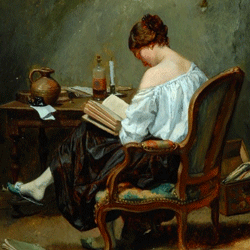
Girl Reading (1850), oil on canvas, Andre Fontaine
Writing on my phone. On the train. Woke with a sore throat. Snow outside the Manhattan window turning to sludge and then puddles. In the morning Alex and I made our way to Tisch to pick up books from Wendy and sit in on Fred Moten’s class. He spoke for three hours about a paragraph in Zalamea’s Synthetic Philosophy of Contemporary Mathematics, constellating the Isley Brothers with quantum physics with the history of slavery with Solange with financialization with the spatio-temporal dimensions of Judaism with critiques of the individuated liberal subject. In Fred’s presence I’m always in awe. When he says the stream of thought will go where it goes, I know what he means, what it feels like, to want to read everything. To have no filters. To be a being who is…interested. “You know, it’s like a river that winds through all these different terrains, and part of it winds through the history of science, and part of it winds through category theory and general topology, and part of it winds through Russian cinema—I’m just interested.” (Moten)
Would like to linger more on the things I read and not just mark passages to return to…later. Has grad school de-skilled me? Has the process of becoming a “historian”—of having to read thousands of pages per class in grad seminars destroyed my ability to read slowly? Poetry is becoming harder to read. It demands a kind of attention other than the kind of attention I have become accustomed to—the temporality forced into me by the academic grind.
Last semester I did my comprehensive exams. For two hours I was quizzed by 4 professors on the contents of ~400 books. My fields were: Prisons and Police; History and Political Economy of Race in America; Social and Political Theory (Marxism, psychoanalysis, critical theory, Frankfurt School, feminist/queer theory, post-structuralism); and Black Literature, Theory and Cultural Studies. “Studying” for my exams hardly felt like studying at all—I was just doing what I’ve always done: read.
But the thing about being in academia is…you can’t just read what you want to read (unless you’re Fred!), you’re supposed to specialize. Your supposed to read within your discipline, to be monogamous with your dissertation topic. But sometimes…my mind needs ventilation. I need to let my mind wander. So this spring break I went on a kind of “retreat”—I rented a little eco-bungalow on a mountain overlooking the ocean in Deshaies, Guadalupe, with the intention to do nothing except read, journal & spend time in nature. It’s weird to now have a life where I have to schedule in these compressed snatches of leisure. Between my academic life and artist/public intellectual life all life is becoming work work work. Constant travel, mountains of assignments to grade, grant applications, bureaucracy, student emails, assigned readings, lesson planning, talks—in psychoanalysis I am sometimes too fatigued to finish my sentences.
What was it? “The disquieting feeling that we don’t own ourselves.” My poor journal, neglected since last semester. Turned inside-out and called into presence by the Pavlovian PING of the push notification. Life becomes the work of feeding the avatar. It’s nothing new. It’s the same ole subject formation, in overdrive. The you of I (alienated Lacanian subject) — identification with an image of self that circulates as…I-am-that. When the avatar takes over your life, when you become what the public makes you…how can you find a way to re-inhabit your life as you? Quiet. Unplug. Has busyness evacuated my inner life? I’m still me. But look at how much my situation has changed…
Here are my notes on the books I read over spring break (some finished the week after I returned…)
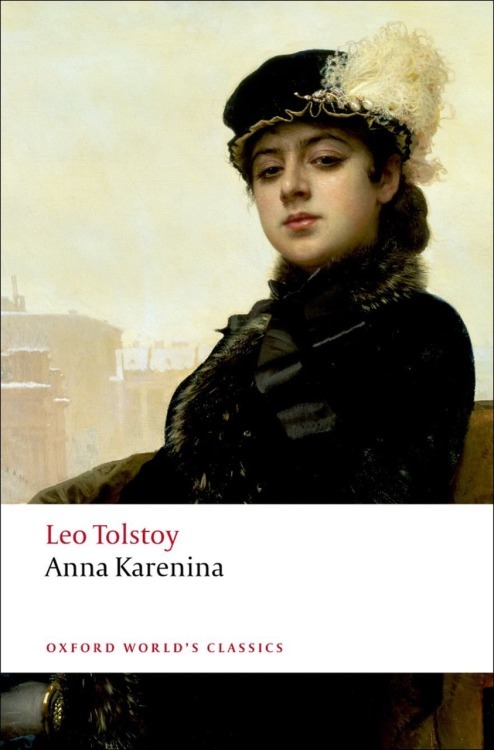
Tolstoy - Anna Karenina
My skin takes it in. Ghosts enter and leave this vessel, Sunship Earth. Body, too, will become a ruined beach house covered in pale violet morning glory vines, its shutters still hinged shut. Now Nabokov is analyzing the varied march of time in Tolstoy—there is something like a moral in Kitty and Levin’s slow dance, against the locomotive thrust of Anna and Vronsky.
A road—to where? The bull in the clearing, the smell of the tiny yellow flowers and the fade, the gloaming, the wall of water, peach-haloed in the sunset. The dimming, the peep of the first cicada, the crushed cicada that lost its way, the dream that wrote her destiny, the dirty peasant rooting around in the sack—the man split by the wheels of the locomotive. A force that nothing, no one escapes. [Holy shit. As I type these notes from my journal my train has been stopped in Providence because the train ahead of us hit someone]. Yes, I have had the dream of the man with his hand in my sack [“It was crowded in the market. I was trying to photograph the flowers but the image was distorted because a man had his hand in my backpack”]. Can a sudden silence wake a sleeping body? I think, as I wake, that I have caught the day in the precise moment of transition. What crossed over then, the wind swept the island clean. Like Anna Karenina I have been under the spell of the dream: what I now no longer know if I can trust.
Nothing could have saved Anna
the terrible omen flashing above her life…
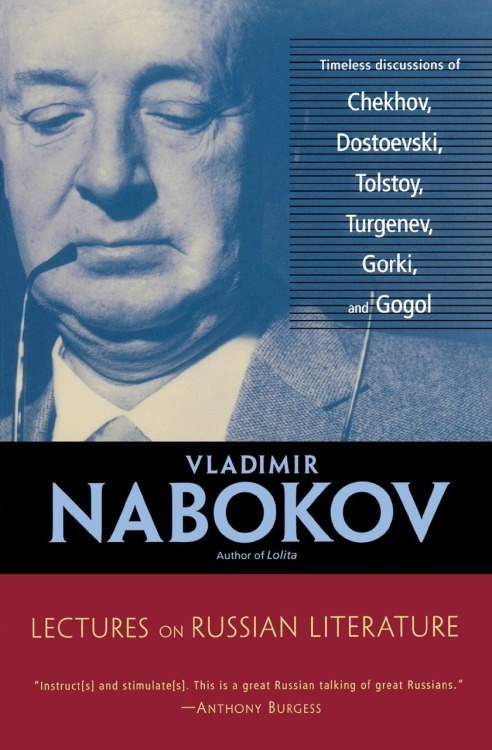
Nabokov - Lectures on Russian Literature
Freud and Baldwin love Dostoyevsky. Nabokov loathes him. What does that tell you about the kinds of people who love and hate Dostoyevsky? Lovers of Dostoyevsky: hysterics, neurotics, fringe-dwellers, madmen. Dostoyevsky is to literature what Zulawski is to cinema (emotional excess–which is why teens also love Dostoyevsky). This whole book is an argument for Tolstoy and against Dostoyevsky. Lovers of Tolstoy: the good, the moral, the erudite, Oprah. Nabokov is a snob à la Adorno, but his lectures on Tolstoy are damn good (skip the ones on Dostoyevsky), especially the ones on dreams and time in Anna K.
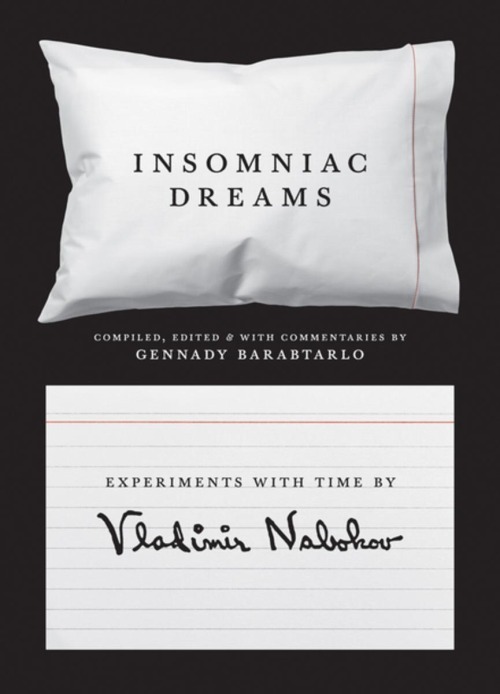
Nabokov and Barabtarlo - Insomnia Dreams
This book is pretty fucking cool. It is an inventory of Nabokov’s proleptic dreams, which he wrote down on notecards after reading J. W. Dunne’s An Experiment with Time. Dunne was an aeronautical engineer and crackpot philosopher who developed what I sometimes call stoner dream theory. He believed that past-present-future exist simultaneously and that the experience of time as an arrow moving forward is an effect of waking consciousness. In dreams we are unhitched from normative time and can access the future–are touched by future events.
Notebook notes:
Dunne and Nabokov dream to know time in every direction. So future events loop back to pierce our sleeping heads. Did I believe—the future is making contact with me. What did the dream corrupt? I could not outrun it. Nabokov dreaming of South Station [strange, that’s where I’m headed as I type up these notes…].
Dreams of the lepidopterist: chasing the butterflies with a giant spoon instead of a net. Sometimes he’s an insufferable pedant. But even pedants can have a compelling dream life…

Lemov - Database of Dreams: The Lost Quest to Catalog Humanity
Professor Lemov teaches in the History of Science department at Harvard. She is currently a faculty fellow in a year-long Crime and Punishment seminar at Harvard that I am also a part of. I first got interested in her work after she presented an excellent paper on the history of Cold War behaviorist experiments (many of which were conducted on prisoners, including the practice of “psychosurgery”) and early efforts to use data to construct psychological theories of deviance. When I found out she wrote a history of a dream database, I knew I had to read it.
This book is a history of Bert Kaplan’s ambitious mid-20th century quest to create a database of dreams and psychological data (called the Primary Records in Culture and Personality), which consists of a collection of the raw notes of the thoughts, feelings, and dreams of people from around the world, stored on the now-obsolete technology of the Microcard. It is at once a history of: microfilm technologies, data science, the information storage ambitions of postwar social scientists and anthropologists, and psychologists’ obsession with the dreams and unconscious thoughts of ethnic “others.” The story of the database is fascinating in itself…but I wanted to know more about what was in the repository. Sometimes the unconscious speaks:
“A man named Birch Tree told of a dying young man of his acquaintance who had dreamed too ambitiously: one night, he was able to see ‘every leaf in the whole world’ and perished soon after, like the leaves that fall from the trees each year.”
“dream #19, in which he was shooting birds, surrounded by sunflowers as big as evergreen trees”
“Dreams were “palimpsests for understanding what could be called ‘not-self,’ the place at which the self begins to shade away into nothingness or something else.”
“If you sat in a library looking at someone’s dreams, what were you seeing?”
The database of dreams was dead on arrival.
But there’s another living database of dreams assembled by oneirologist Kelly Bulkeley: http://sleepanddreamdatabase.org/ – have read and enjoyed several of Bulkeley’s books too. The convocation of the oneirologists…

Sliwinski - Mandela’s Dark Years
How strange, I read this two days before the death of Winnie Mandela. Did Nelson dream of Winnie while in prison? There is a lot to chew on in this little book. I keep returning to the dream that is circled in the text, Nelson Mandela’s dream from prison:
I had one recurring nightmare. In the dream, I had just been released from prison—only it was not Robben Island, but a jail in Johannesburg. I walked outside the gates into the city and found no one there to meet me. In fact, there was no one there at all, no people, no cars, no taxis. I would then set out on foot toward Soweto. I walked for many hours before arriving in Orlando West, and then turned the corner toward 8115. Finally, I would see my home, but it turned out to be empty, a ghost house, with all the doors and windows open, but no one at all there.
The subject in absentia dreams their erasure while in prison, the experience of becoming-ghost. (Mandela’s recurring nightmare. How apartheid structures the geography of the unconscious…)
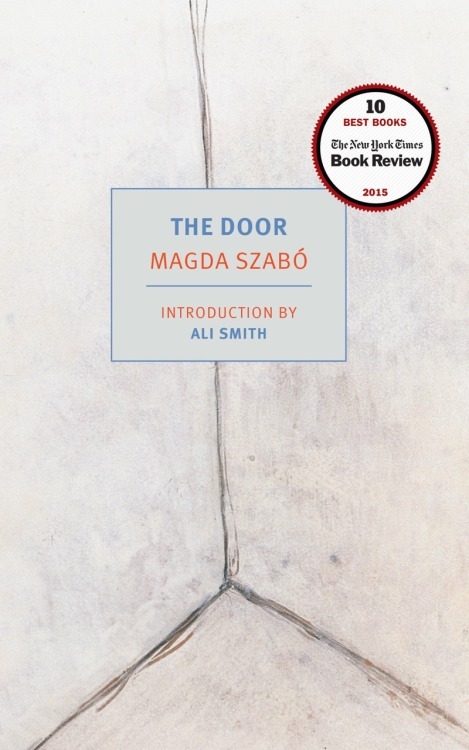
Szabó - The Door
“If there was [an] article about what to read once you’ve finished Elena Ferrante’s Neapolitan novels, The Door—though it lacks the scope of those books—might top the list.” I read no such list but did finish the Neapolitan novels last year. I read The Door after it was recommended by 3 of my feminist friends.
To say what this book is about would fail to get at the experience of reading this book. It’s deeply disturbing and all the more so because Emerence, the narrator’s housekeeper, is the exact likeness of my aunt Helen. They are women for whom every emotional door has been sealed shut. They both had dogs that were passionately attached to them. Under what conditions does the wound grow into an impenetrable shell? Grow into the pride of self-sufficiency…
Notes:
The book is bookended by a recurring nightmare of a door that won’t open. An ambulance outside, and the silhouettes of paramedics seen through glass. Most of my dreams are about the absence of shelter, porous structures, rooms that are always open to invaders. But here is a nightmare about being trapped inside with someone in need of help. Ferrante’s Days of Abandonment resonates too.
Resonances.
Lightning strikes the two babes Emerence was fleeing with. In Anna Karenina, lightning missed Kitty and child. The plots of two novels are crossed. What characters evade in one novel befalls characters in another. It’s like the books are talking to each other through the body of me.
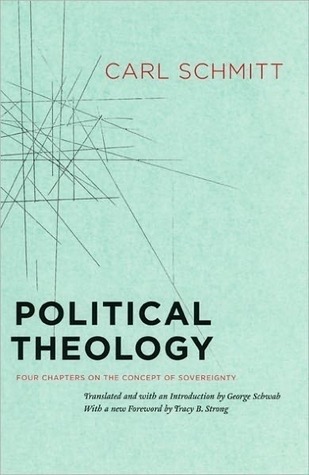
Schmitt - Political Theology
We should discuss this book in person. My thoughts are too sprawling to give shape to them here. People on the left read Schmitt for his critique of liberalism and though there are parts of it I find compelling (I’ve elaborated the concept of a “financial state of exception” in my book Carceral Capitalism), the part about liberal democracy lacking decisionism because it’s weighed down by a Weberian bureaucracy is, I think, wrong. Well, that’s what I felt while reading McCoy’s In the Shadows of the American Century immediately following Political Theology.
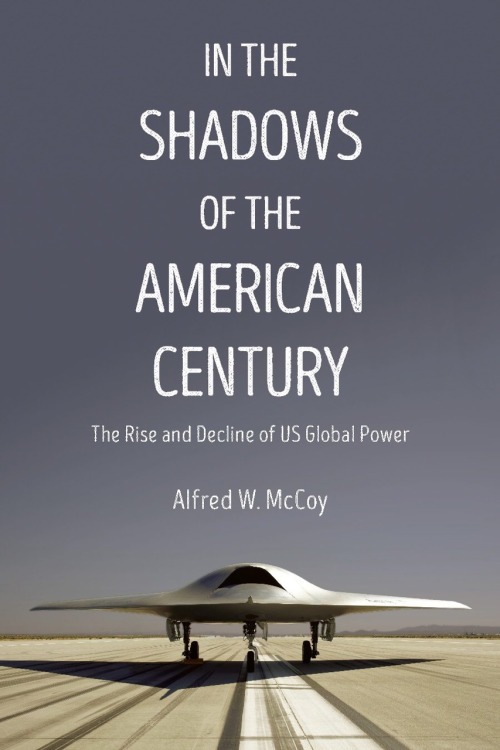
McCoy - In the Shadows of the American Century
This book is part of an ever-growing body of literature on the decline of US hegemony and the rise of China as a global superpower. But what this book adds to the analysis is a thought-provoking discussion of the changing nature of geopolitical struggles–from a navel-based strategy to a land-based strategy. McCoy unpacks the influence of Halford Mackinder’s theory of the Geographical Pivot of History, which posits that the future belongs to whoever controls the Eurasian landmass (the World-Island). During the Cold War the US has maintained its hegemony by controlling key axial points–through NATO in western Europe (on the west side of the World-Island), and the strategic positioning of military/naval bases around the Pacific, and the forging of political and economic alliances with South Korea, Japan, the Philippines, etc. This book is a good overview of how the US built and maintained its empire, and offers possible blueprints for its decline (McCoy’s analysis of Obama’s attempts to salvage US hegemony through his “pivot toward Asia” and Trump’s acceleration of the decline of US hegemony was interesting…). After reading about the CIA’s covert operations in Latin America I felt that liberal democracy is not at all lacking decisionism, as Schmitt says, but like all states it maintains its power through brute force (militarism/war), international diplomacy, strategic alliances, soft power, proxy warfare and covert operations, international trade agreements, technological prowess, surveillance, etc.

Saterstrom - Ideal Suggestions
What is the relationship between what is seen and unseen?
Saterstrom’s poetics can be summed up by her line: “dust mote footing the invisible”–the “thing” itself is often absent, even as it mutates everything present, but there are ways to access ghosts, traces, invisible forces, and the disappeared. Like a projection that flashes when it catches smoke in the phantasmagoria–you can catch it in the transition.
The form of the book is satisfying. I enjoy the way it alternates between ars poetica and the enactment of the poetics it is trying to sketch.
Notes:
“In the other world everything also exists. But in versions complicated by the softness that dissolution makes.”
“what happens between women when the center of female triangulation is scarcity and lack?”
Simone Weil: “When a contradiction is impossible to resolve except by a lie, then we know that it is really a door.”
divinatory poetics as a way to bear “the absurdity and enchantment of human experience”
to write from “within the membranous precincts between our multiple bodies in the larger rhizomatic field of resonances, where much is sounding and is also unsounded.”
Christian Hawkey: “the holes in our bodies and skulls are voice chambers, sound chambers, wherein our own voiced selves and the voiced selves of others constantly enter and exit, and are changed by our bodies upon entrance, exit. Consciousness…is less a vehicle for “self-presence” than a void, a blank space at the site of intersection.”
“the friendship of our ghosts”
“A raw garnet dug up from earth appears as a piece of burned glass and smells of warm dirt. How did this garnet come to rest here, pinned between sky and sea, a mineral between the here and hereafter? Lines made through the absenting of lines, they suggest their phantom shapes into calligraphy. And someone arrives, a dead poet, she writes in an elegant script a poem about geese. It is a melancholic poem featuring geese, a landscape, and reflections about death. How do the deceased live within the blurred calligraphic strokes dependent upon whatever it was we erased? Who was here first? The process of being read, truly read. One day our lines appear in some other’s erasure.”
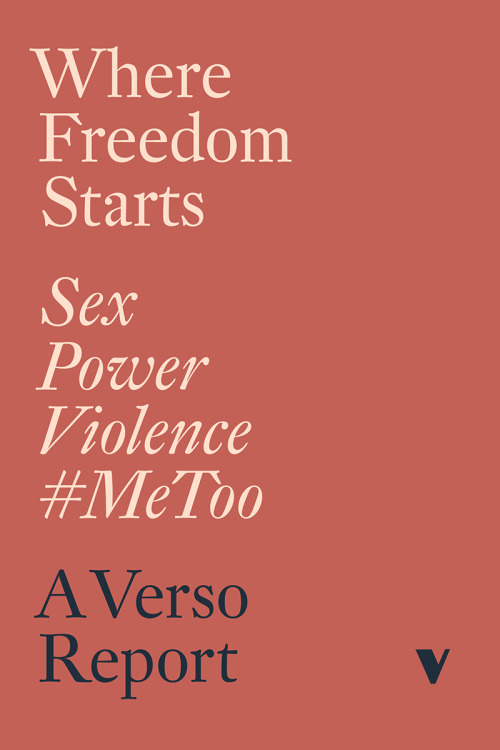
Where Freedom Starts (an anthology of essays on #MeToo)
This is an excellent collection of essays on #MeToo that captures the spectrum of feminist responses to the nascent movement. It includes black feminist critiques of carceral feminism, a discussion of black and Latinx vulnerability to sexual violence in the sphere of domestic labor, queer critiques of moral sex panics, feminist analyses of social reproduction, analyses of how undocumented women are hyper-vulnerable to sexual assault in the workplace (and at risk of deportation if they report sexual abuse), and more. I appreciate that many of these essays attempt to grapple with the emotionally and politically messy aspects of sexual violence–How do we determine the category or degree of the harm done? What you do when you feel ambivalence toward your rapist and internalize blame? How is victimhood constructed? I plan to return to these topics and questions in an essay I hope to write in May.
**This ebook is free from Verso.** Get it here.
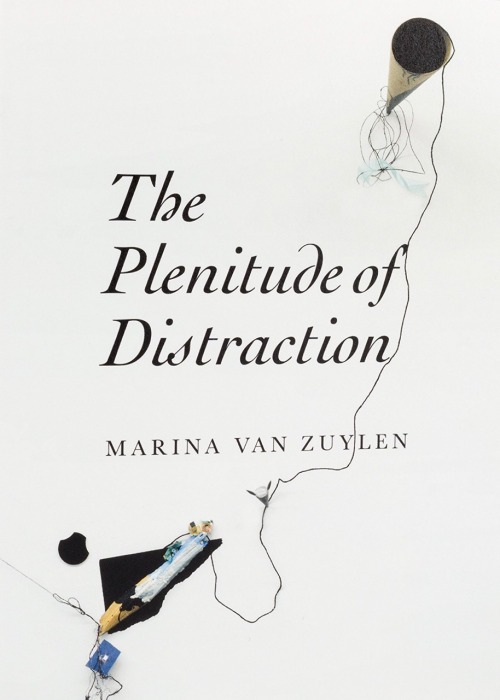
Marina Van Zuylen - The Plentitude of Distraction
If I ever teach my Lost Girls class on the poetics of wandering, I would definitely include this book!! So, so good. Yes, the poet needs to give herself over to her reveries. To luxuriate in the waywardness of experience–the soul cut loose.
Notes:
Darwin’s great regret: “Up to the age of thirty, or beyond it, poetry of many kinds … gave me great pleasure, and even as a schoolboy I took intense delight in Shakespeare, especially in the historical plays. I have also said that formerly pictures gave me considerable, and music very great delight. But now for many years I cannot endure to read a line of poetry: I have tried lately to read Shakespeare, and found it so intolerably dull that it nauseated me. I have also almost lost my taste for pictures or music…. My mind seems to have become a kind of machine for grinding general laws out of large collections of facts, but why this should have caused the atrophy of that part of the brain alone, on which the higher tastes depend, I cannot conceive…. If I had to live my life again, I would have made a rule to read some poetry and listen to some music at least once every week; for perhaps the parts of my brain now atrophied would thus have been kept active through use. The loss of these tastes is a loss of happiness, and may possibly be injurious to the intellect, and more probably to the moral character, by enfeebling the emotional part of our nature.”
Discussed this Darwin passage with my analyst for some time. I don’t want to become a work machine! Give me “delicious idleness”!
“stop measuring your days by what you can report to your boss or to your conscience”
waywardness: “reveries unfasten him from his constructed social persona, eventually converting dispersal into a gathering of self-hood”
Blaise Pascal, Pensées: “The only thing that consoles us for our miseries is diversion. And yet it is the greatest of our miseries. For it is that above all which prevents us thinking about ourselves and leads is imperceptibly to destruction. But for that we should be bored, and boredom would drive us to seek some more solid means of escape, but diversion passes our time and brings us imperceptibly to our death.”
“the pure pleasure of a contemplative experience”
“It is not too late to side with some of the great propagandists of wasted time, with the practitioners of reverie, and cultivate the pleasures and pains of mental mayhem.”

Marx - Capital Vol 1
It’s always a good time to re-read Marx. In December I started a Capital reading group with my comrades LaKeyma and Joohyun. Marx is best read with your women of color crew!
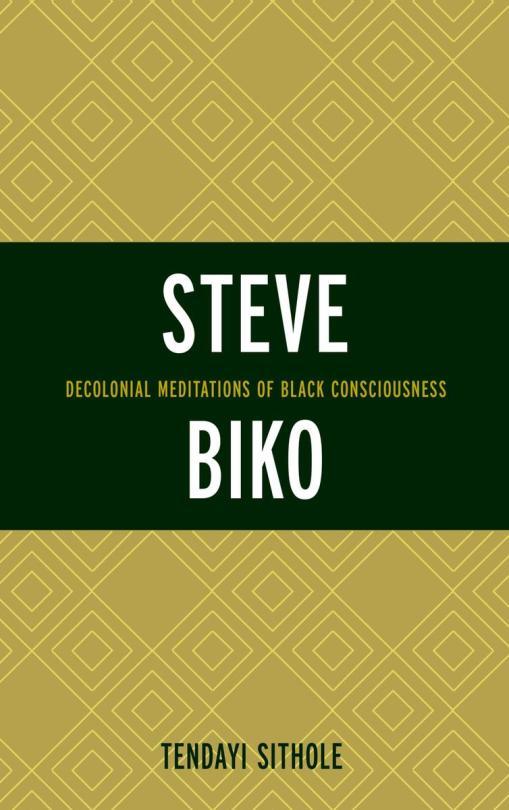
Sithole - Steve Biko: Decolonial Meditations of Black Consciousness
Did an event with the incredible Tendayi Sithole at NYU (moderated by Fred Moten and Wendy Lotterman), so I wanted to read Tendayi’s work on Biko before the event. Many parts of the book draw on Afropessimism to analyze Biko’s liberatory political philosophy. We had a long discussion (privately and during the panel) about Afropessimism’s reception in South Africa (”it’s given us a language to understand our predicament,” says Tendayi). Such good work, and such a wonderful person and poet too!! During the reading Fred said Tendayi and I “became a band.”

McGuckian - The Flower Master
Re-read this at the Deshaies botanical gardens in Guadalupe. Unfuckwithable. McGuckian is one of my favorite poets of all time. Also read the parts about McGuckian in Northern Irish Poetry and the Russian Turn. Had no idea McGuckian draws so heavily from Russian literature, and that she feels there is a natural kinship between Russians and the Irish due to their historical predicaments…
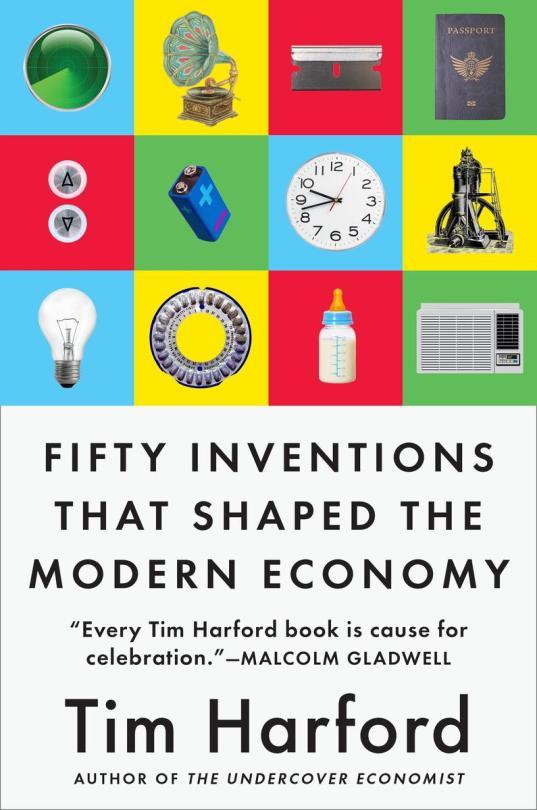
Harford - Fifty Inventions that Shaped the Modern Economy
Pop economic/business and tech history. Replete with compelling stories and fun facts about underappreciated inventions. The chapters I was most interested in were the ones about inventions that fundamentally transformed gendered labor (TV dinners, infant formula, the birth control pill). After a while this books started to annoy me because the novelty wore off and I can only handle so much praise of the so-called wonders of capitalism.
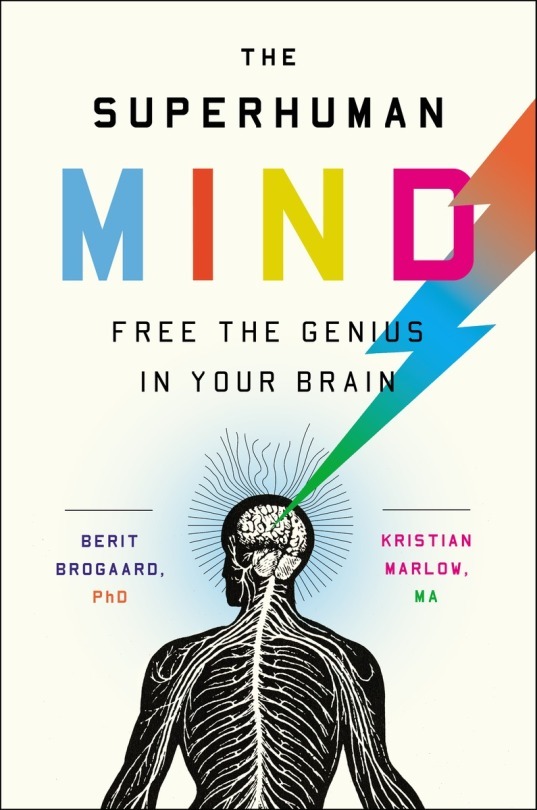
Brogaard and Marlow - The Superhuman Mind
I don’t think I’m any smarter after having read this book. It’s somewhere between pop science (in the style of Oliver Sacks) and self-improvement literature. The book tries to give you mental “hacks”–mnemonics and algorithmic mental shortcuts. Most of the the book describes case studies of people who have accidentally unlocked superhuman mental capacities as a result of a brain injury, stroke, etc…or they were just born neurologically atypical. Synesthetes have good memories. If you’ve ready any of the pop sci books on memory you already know these tricks… the Greeks have known about the Memory Room for a while too…
Still reading:
Moten’s Black and Blur
Anne Boyer’s A Handbook of Disappointed Fate
Doudna and Sternberg’s A Crack in Creation: Gene Editing and the Unthinkable Power to Control Evolution
Frank Stanford - The Battlefield Where the Moon Says I Love You
22 notes
·
View notes